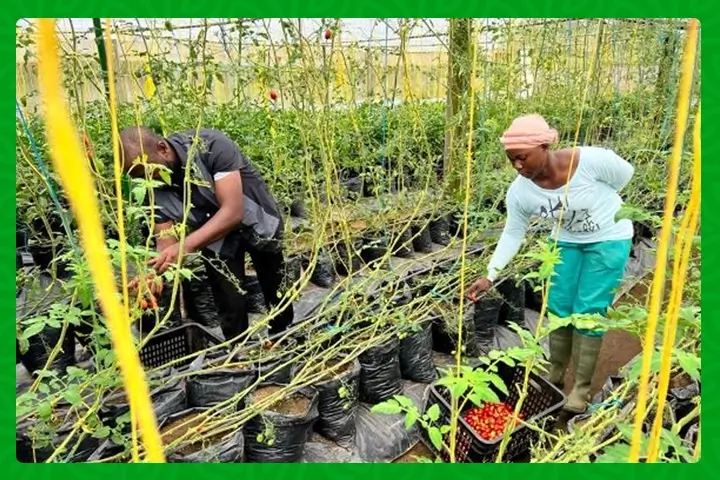
As Cameroon grapples with soaring food prices triggered by global disruptions, one visionary entrepreneur is sowing the seeds of change. Meet Roland Fomumdam, a 41-year-old innovator who is leveraging climate-smart greenhouses to not only stabilize food prices but also revolutionize agricultural practices in the country.
The Rising Challenge of Food Prices
Since last year, the prices of essential food items in Cameroon have been on an alarming ascent, adversely affecting low-income earners like Tessang Marie, a small-scale trader in Douala. The disruption in global supply chains, a consequence of the conflict in Ukraine, has left many struggling to afford a daily meal.
In the face of this crisis, Roland Fomumdam emerges as a beacon of hope, addressing the root cause of the problem – price fluctuations in the agricultural sector.
Innovation Takes Root
Upon returning to Cameroon from the United States at the age of 25, Fomumdam recognized the untapped potential in the agricultural industry. His focus was clear: tackle the price fluctuations that plagued the market. In 2013, he introduced the first low-cost climate-smart greenhouse farm, founding Greenhouse Venture Cameroon.
Fomumdam’s innovative approach aimed to ensure a consistent quantity of produce throughout the year, mitigating the impact of seasonal variations on prices. Through Greenhouse Venture Cameroon, he not only pioneered locally constructed greenhouses but also established the Greenhouse Academy to train precision agriculture enthusiasts.
Local Solutions to Global Challenges
While greenhouse technology was introduced to Cameroon in 1995, Fomumdam’s localized and cost-effective approach has ignited widespread adoption. His greenhouses are customized to Cameroon’s ecological zones, enabling year-round production and offsetting the need for certain imports.
Today, Fomumdam’s farms produce the largest quantity of strawberries and cherry tomatoes in the country, showcasing the potential of local innovation to meet market demands. The greenhouse technology has allowed him to sell produce at consistent prices throughout the year, offering an alternative to the price volatility seen in traditional farming.
Harvesting Success and Knowledge Transfer
In one of Fomumdam’s farms in Bangue, the harvest is a testament to the success of the greenhouse model. The 720m² greenhouse yields a bountiful harvest of bell peppers, tomatoes, and cherry tomatoes. Notably, Fomumdam has been able to substitute over 90% of imported bell peppers, demonstrating the impact of local innovation on reducing reliance on foreign markets.
Beyond his own farms, Fomumdam extends his impact through the Greenhouse Academy, engaging students like Godwill Angereh. As a student, Angereh is gaining knowledge of the technology, motivated by the opportunities that farming presents in the face of job difficulties.
Challenges and Future Growth
Despite the challenges of meeting current market expectations, Fomumdam remains optimistic about the future of greenhouse technology in Cameroon. He envisions a collective production of 1 million tons per year by 2024 and aims to expand into wheat production to address shortages caused by global conflicts.
While Fomumdam’s greenhouse initiative has yet to receive direct financial support from the government, its endorsement and the construction of greenhouses in secondary schools signal a promising future. Through innovation and knowledge transfer, Roland Fomumdam is not just stabilizing food prices; he’s cultivating a greener, more resilient future for Cameroon’s agriculture.
Stay updated with the latest farming tips and agriculture industry news from Africa by subscribing to our newsletter. Don’t miss out on valuable insights and updates. Follow us on Twitter, LinkedIn, and Facebook to join our farming community and stay connected with us.



















